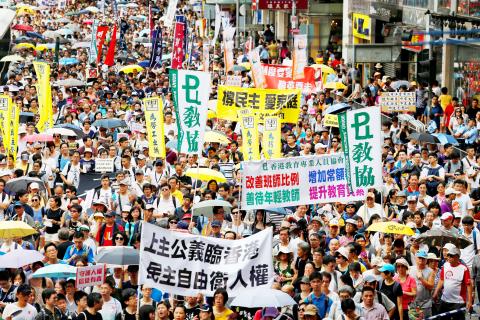Thousands of Hong Kong residents yesterday marched in protest on the 19th anniversary of the territory’s return to Chinese rule, as tensions simmer against Chinese authorities over the abductions of several Hong Kong booksellers.
Some waved banners criticizing Beijing over alleged cross-border abductions as the act of a “totalitarian” regime, as well as calling for the release of leading dissidents.
“This is a very grave threat to the safety of Hong Kong residents, that an unknown force is spying on people,” pro-democracy lawmaker Cyd Ho (何秀蘭) said at the rally. “The Hong Kong government has to follow up with the central government on what is really happening behind the scenes.”

Photo: Reuters
The territory has been unnerved in the past year by the disappearances of five booksellers who specialized in works critical of Chinese leaders.
One of the men, Lam Wing-kei (林榮基), who was detained for eight months by Chinese agents and released last month, said Beijing was “violating Hong Kong’s rights” through illegal cross-border enforcement operations.
The tactics have raised fears that Chinese Communist Party (CCP) rulers in Beijing are eroding the so-called “one country, two systems” formula that has granted Hong Kong a high degree of freedom and autonomy since its 1997 return to Chinese rule.
China has denied any wrongdoing.
Lam, who had been due to lead the march that each year draws thousands of people, withdrew at the last minute, citing safety concerns after being followed by two strangers, a lawmaker said.
“He feels increasingly concerned about his personal safety,” Democratic Party Legislator Albert Ho (何俊仁) said.
Hong Kong and Macau Affairs Office of the State Director Wang Guangya (王光亞) said the booksellers had “destroyed” the one country, two systems formula by publishing books that are banned in mainland China.
However, Chinese President Xi Jinping (習近平), speaking in the Great Hall of the People in Beijing to mark the CCP’s 95th anniversary, yesterday said that “no matter what the difficulties and challenges, our confidence and determination toward one country, two systems will not waver.”
Xi said that Hong Kong would continue to enjoy a high degree of autonomy and Beijing would strictly adhere to the law.
Yesterday’s protests are considered a barometer of public sentiment toward Beijing ahead of territorial legislative elections in September.
A group of activists who advocate Hong Kong independence from China are planning an evening “black mask” protest outside the Liaison Office of the Central People’s Government in the Hong Kong Special Administrative Region.
A 79-day Umbrella movement in late 2014 demanding Beijing allow full democracy in Hong Kong brought chaos to the streets.

NATIONAL SECURITY THREAT: An official said that Guan Guan’s comments had gone beyond the threshold of free speech, as she advocated for the destruction of the ROC China-born media influencer Guan Guan’s (關關) residency permit has been revoked for repeatedly posting pro-China content that threatens national security, the National Immigration Agency said yesterday. Guan Guan has said many controversial things in her videos posted to Douyin (抖音), including “the red flag will soon be painted all over Taiwan” and “Taiwan is an inseparable part of China,” while expressing hope for expedited “reunification.” The agency received multiple reports alleging that Guan Guan had advocated for armed reunification last year. After investigating, the agency last month issued a notice requiring her to appear and account for her actions. Guan Guan appeared as required,

A strong cold air mass is expected to arrive tonight, bringing a change in weather and a drop in temperature, the Central Weather Administration (CWA) said. The coldest time would be early on Thursday morning, with temperatures in some areas dipping as low as 8°C, it said. Daytime highs yesterday were 22°C to 24°C in northern and eastern Taiwan, and about 25°C to 28°C in the central and southern regions, it said. However, nighttime lows would dip to about 15°C to 16°C in central and northern Taiwan as well as the northeast, and 17°C to 19°C elsewhere, it said. Tropical Storm Nokaen, currently

PAPERS, PLEASE: The gang exploited the high value of the passports, selling them at inflated prices to Chinese buyers, who would treat them as ‘invisibility cloaks’ The Yilan District Court has handed four members of a syndicate prison terms ranging from one year and two months to two years and two months for their involvement in a scheme to purchase Taiwanese passports and resell them abroad at a massive markup. A Chinese human smuggling syndicate purchased Taiwanese passports through local criminal networks, exploiting the passports’ visa-free travel privileges to turn a profit of more than 20 times the original price, the court said. Such criminal organizations enable people to impersonate Taiwanese when entering and exiting Taiwan and other countries, undermining social order and the credibility of the nation’s

‘SALAMI-SLICING’: Beijing’s ‘gray zone’ tactics around the Pratas Islands have been slowly intensifying, with the PLA testing Taiwan’s responses and limits, an expert said The Ministry of National Defense yesterday condemned an intrusion by a Chinese drone into the airspace of the Pratas Islands (Dongsha Islands, 東沙群島) as a serious disruption of regional peace. The ministry said it detected the Chinese surveillance and reconnaissance drone entering the southwestern parts of Taiwan’s air defense identification zone early yesterday, and it approached the Pratas Islands at 5:41am. The ministry said it immediately notified the garrison stationed in the area to enhance aerial surveillance and alert levels, and the drone was detected in the islands’ territorial airspace at 5:44am, maintaining an altitude outside the effective range of air-defense weaponry. Following